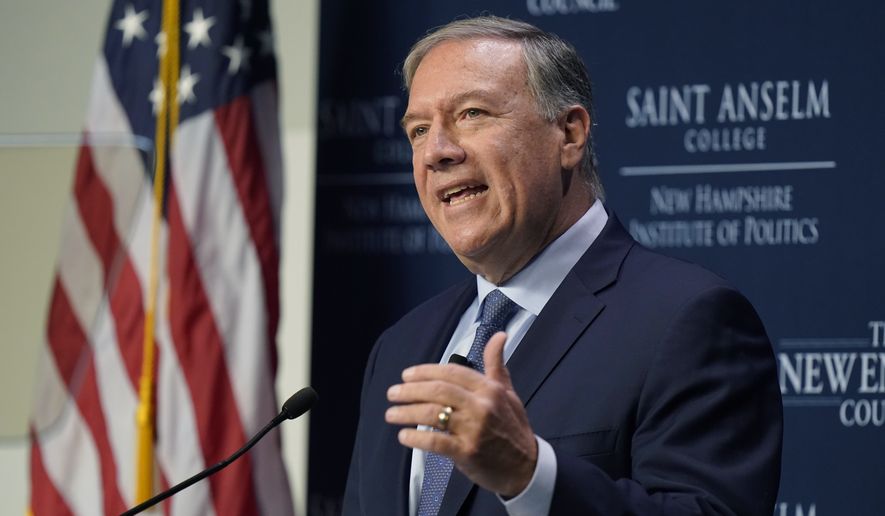China’s government is seeking to silence former Secretary of State Mike Pompeo for comments critical of the ruling Communist Party made during a new series of broadcasts that seek to speak directly to the Chinese people.
The first broadcast on Sept. 14 focused on differentiating between the Chinese Communist Party (CPC) and China’s 1.4 billion people, a key China policy approach launched by Mr. Pompeo at the State Department during the Trump administration.
The Chinese Embassy in Washington responded to the broadcast by sending an angry letter to the Hudson Institute, the Washington think tank that is hosting the broadcasts at its new China Center. The Sept. 27 letter criticized Mr. Pompeo for making a “groundless accusation against the Communist Party of China.”
“Any attempts to cut off the blood ties between the CPC and the Chinese people are doomed to fail,” the letter, signed “the Chinese Embassy in the US,” stated.
Mr. Pompeo tweeted the letter Tuesday with the comment: “The CCP wants me to stop speaking the truth. Ain’t gonna happen.” The tweet included an emoji of a person placing a paper in a trash can.
The former secretary of state, who recently traveled to Taiwan, told The Washington Times he is undeterred by the criticism.
SEE ALSO: America must counter Putin’s nuclear threat proactively, not reactively
“The CCP seems highly peeved by the truth,” Mr. Pompeo said. “Seeking to silence me is at odds with its claims that, as a former secretary of state, I’m irrelevant.”
He added: “In any event, I intend to keep speaking to the American people about how the CCP has impacted their lives, and to the Chinese people about how they can have better lives too once their oppressor is confronted.”
Hudson President John Walter issued a statement on Twitter rejecting the Chinese criticism.
“The genocidal #CPP is the oppressor of the Chinese people & an enemy of free people around the globe,” he wrote in a tweet. “The Chinese people know this & the American people know it. … No one at Hudson is intimidated by this.”
Miles Yu, the director of the China Center who served as Mr. Pompeo’s chief China policymaker, said the former secretary of state has wanted for some time to speak directly to the Chinese people. The Hudson broadcasts were planned for when Mr. Pompeo was still in office, “but we ran out of time,” Mr. Yu said.
“As a private citizen, this is his passion — to talk to the Chinese people directly and this is something the CCP fears because they falsely claim they represent the people of China,” Mr. Yu said, adding, “We will continue this series because truth will never expire.”
Mr. Pompeo has been a major target of Chinese attacks for his criticisms of the government. As secretary of state from 2018 to 2021, the one-time Republican congressman from Kansas initiated a significant shift in U.S. policy toward China, pushing tougher policies on issues of human rights and aggressive maritime activities.
In January 2021, shortly before leaving office, he officially declared that Beijing’s repressive policies against minority Uyghurs in western China amounted to a “genocide.”
China has denied the charge and according to a recent State Department report, has used disinformation operations worldwide to obscure its treatment of the Uyghurs.
Mr. Pompeo, who headed the CIA under Mr. Trump before moving to the State Department, also shut down the Chinese consulate in Houston that U.S. officials said had been used as a major intelligence collection point.
During a visit to the Philippines in July 2020, Mr. Pompeo said Chinese claims to own some 90% of the South China Sea were “completely unlawful.”
The Chinese Embassy letter stated that the Communist Party, which has ruled China since 1949, was “founded for the people and nurtured by the people, and claimed that some 800 million people have climbed out of poverty under its rule. The statement is a reference to Chinese President Xi Jinping’s recent claim that his anti-poverty campaign had drastically reduced poverty rates among China’s 1.4 billion people.
However, current Chinese Premier Li Keqiang appeared to contradict the president, noting that in 2020 some 600 million Chinese were still earning the equivalent of $140 a month — not enough to pay rent.
“The average per-capita annual income in China is [$4,193], but there are over 600 million people whose monthly income is barely [$140], not enough to rent a room in Chinese cities,” Mr. Li said during a Beijing press conference.
The think tank’s rejection of Chinese officials’ criticism is a marked departure from a similar, more successful effort by Beijing to cancel a Hudson speech by a Chinese dissident in 2018.
Four years ago, a Hudson program called the Kleptocracy Initiative, created to highlight global corruption, scheduled a speech by Chinese dissident billionaire Guo Wengui, a former insider who fled China and has begun publicizing what he said was corruption among senior CCP leaders. The speech was canceled hours before the program was to begin as a result of what a former Hudson associate said were direct threats from the Chinese Embassy.
The Chinese notified the institute in emails that if the dissident’s speech went forward, visits to China by Hudson scholars would be blocked.
A Hudson spokesman said at that time the reason for the cancellation was the result of poor planning.
• Bill Gertz can be reached at bgertz@washingtontimes.com.




Please read our comment policy before commenting.